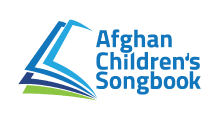The Story

Hearing your favorite song brings up memories of happy times. For Afghans, whose songs have been intentionally eradicated, hearing a familiar childhood song is a much more powerful experience. The sound alone can bring them to tears. As one Afghan stated after the first takeover of the Taliban in the late 1990’s, “They bombed our homes, destroyed our roads, left buildings in a rubble, but when they took our music, they took our soul.”
The Founder and Director of this project, Louise Pascale, lived in Afghanistan in the late 1960’s working as a Peace Corps volunteer. Working with an Afghan poet and musician she collected traditional Afghan children’s songs and shared the songs with children in schools around Kabul. Many years later she found her old copy of the songbook and made a commitment to return the songs to the children of Afghanistan. She founded the non-profit, the Afghan Children’s Songbook Project and the first book printed in 2008 was Qu Qu Qu Barg-e-Chinaar. The songbook has vibrant illustrations of 16 songs in Dari, Pashto, Haragi and Uzbeki and includes a CD of Afghan children singing. The second songbook Awasana, Seesana, was printed in 2013, and it too includes a CD. In 2018, a third book, Bood Nabood, was published, and includes six delightful traditional Afghan children’s folktales, in Dari and Pashto with beautiful illustrations created by a talented Afghan woman illustrator.
She was fortunate early in the project to meet Arsalan Lutfi and the Lutfi family who own and operate TriVision Studios in the U.S. and Afghanistan. TriVision generously offered to become a partner in the project, helping to design and facilitate the creations of the songbooks, printing and distribution.
By 2020, 50,000 songbooks along with accompanying Teacher’s Guide had been distributed to schools, orphanages and family centers across Afghanistan.
Given the political situation in Afghanistan, we are now offering a new visual/digital format of all three books which will be distributed across the world. Afghans living inside and outside of Afghanistan will be able to easily obtain these resources as well as educators or others working with Afghans or who are interested in learning more about the rich Afghan culture. We are excited to offer this newly designed format of the books and we are grateful to Trivision Studios for their expertise and creative input. This new format will guarantee that these delightful songs and folktales will be kept alive for generations to come. We want to thank everyone for helping make this project a reality. Tashakor!


After contacting hundreds of individuals and organizations, Louise was fortunate to be introduced to a well-known and respected Afghan musician from Toronto, Canada, Vaheed Kaacemy. Vaheed recognized the value and need for such a project and was willing to work with Afghan children to record the songs. After hours of work, researching, arranging and rehearsing the songs, he recorded 16 songs, in Farsi, Pushto, Uzbeki and Hazara. Eight of the songs are from the original songbook. The others were collected and/or composed by Mr. Kaacemy.

The Afghan Children’s Songbook & Literacy project, an official 501 (c) (3) has produced two songbooks, Qu Qu Qu Barg-e-Chinaar and Awsana See Sana along with accompanying Teacher’s Guides. There have been over 50,000 songbooks and 7500 Teacher’s Guides distributed across Afghanistan. In addition, 5000 copies of Bood Nabood, a book of traditional Afghan children’s folktales has been published and distributed to children and families in Afghanistan. There are six folktales in Dari and Pashto.
These rich cultural treasures need to be preserved and revitalized and kept alive for many generations of Afghans for years to come.

